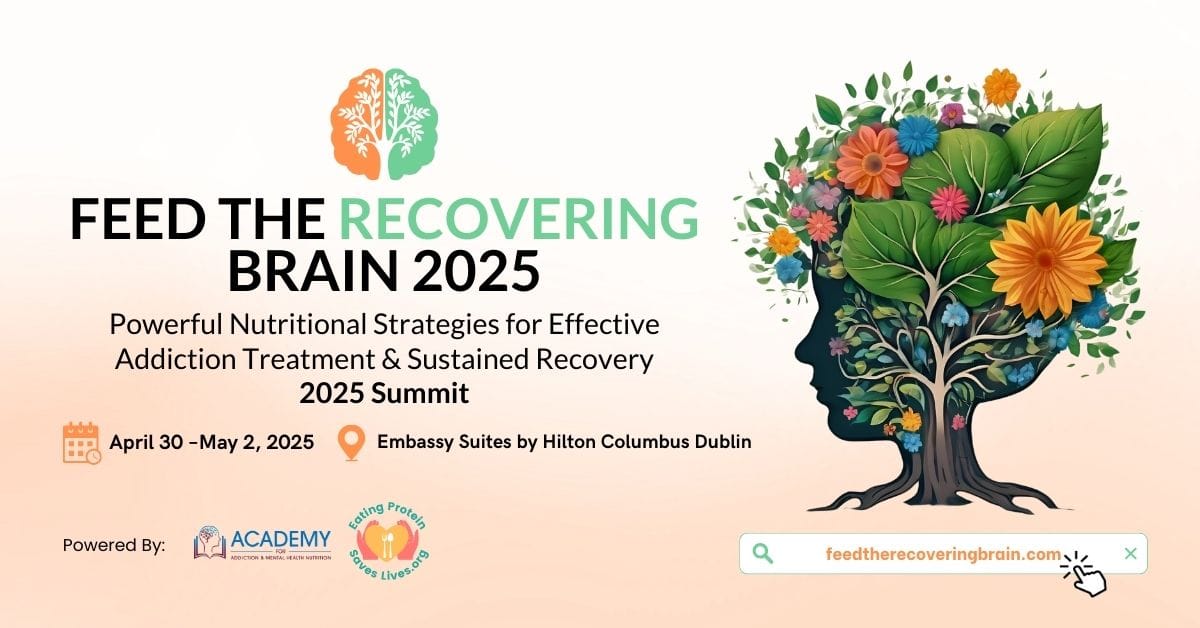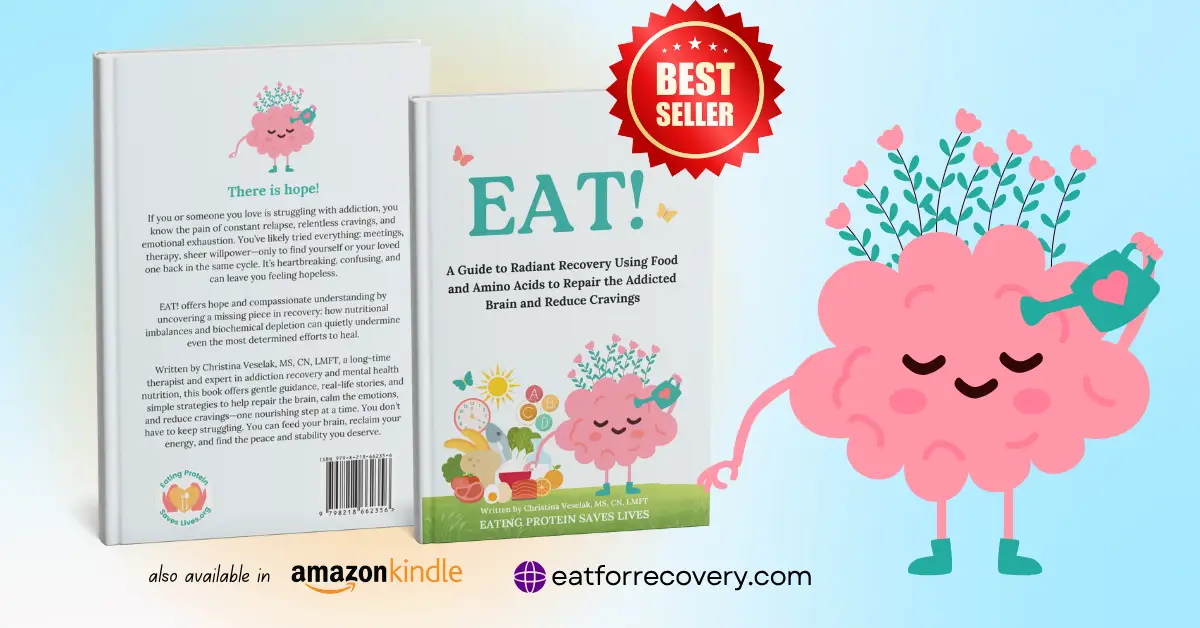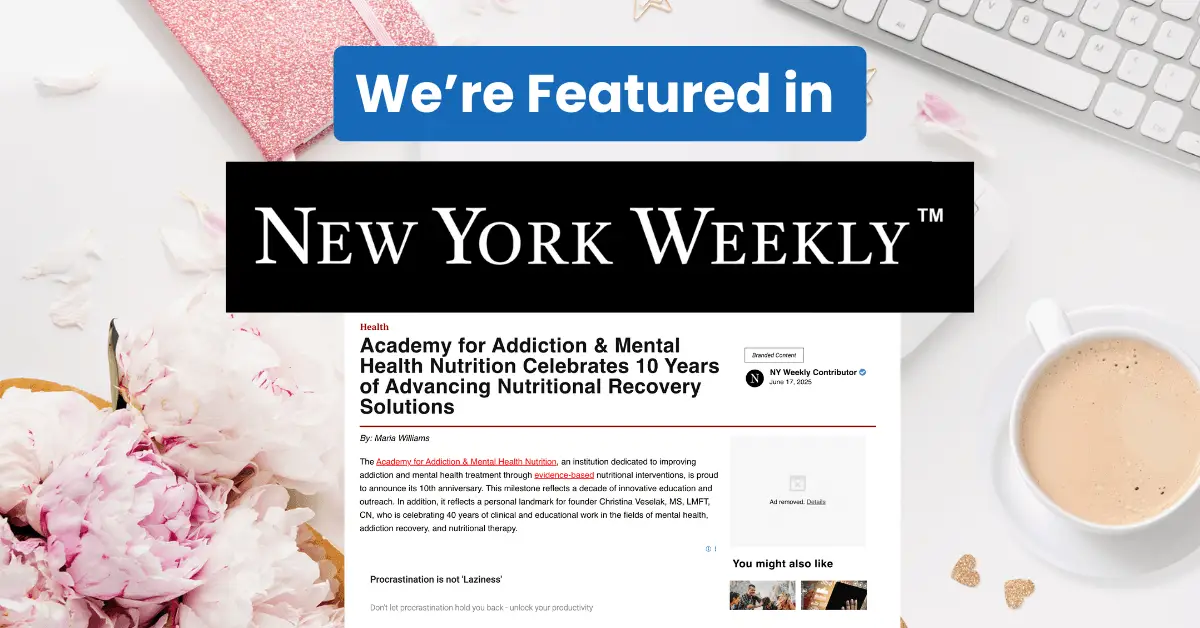One of the scourges of the addiction treatment industry is the ongoing fact that many people relapse and even die after treatment, no matter our best efforts. If they even make it past the first week! According to some researchers (Dr. Best), it can take up to 17 years from the first attempt at abstinence, for someone to achieve 5 consecutive substance-free years (and that doesn’t include being sugar-free!). Many people cycle through program after program, or meeting after meeting, to no avail. They keep being given the same information and therapeutic approaches, and nothing changes. Conversely, some people sail through recovery, don’t have cravings or relapse, or suddenly find the missing piece, the secret sauce that makes all the difference in the world. What is this missing piece?
I have been a licensed psychotherapist working in the addiction field for 40 years. I am a highly trained trauma therapist. I am also a mental health nutritionist. I had a 20+ year practice in Denver, CO specializing in the “chronic relapser” – everyone else’s treatment failure. Most of my clients made it. Why? We thought outside the box. We did the deep dive troubleshooting together and we discovered a few underlying relapse drivers almost everyone had in common. Once those were addressed, people could start thriving and finally start utilizing the recovery skills they had been taught repeatedly.
I am so excited by what my clients and I learned together, that I have gathered a group of top professionals along with people in successful long-term recovery to share these missing relapse prevention pieces with you at the first such summit to occur since 2010 – Feed the Recovering Brain: Powerful Nutritional Strategies for Effective Addiction Treatment & Sustained Recovery
At this summit, you will learn why taking a brain-first approach truly makes a difference. You will learn the primary reason a client can’t even make it past the first week of treatment, and what to actually do about it. You will learn about the necessity of screening for ADHD and traumatic brain injury, two primary recovery saboteurs, and simple nutritional strategies that can help people overcome these challenges and thrive in both recovery and life. You will hear stories from former clients about how eating protein every four waking hours and taking targeted amino acids woke up their brains, and eliminated post-acute withdrawal for good. Treatment program owners will talk about how exactly they successfully integrated brain health strategies into their programs, and you will be offered a step-by-step structure for doing the same thing yourself, thus ensuring better outcomes and even a better financial bottom line. And much more!
We have known for decades the nutrients the brain needs to repair itself and function optimally, but this has never been part of the mental health nor addiction treatment conversation. We are told that addiction is a bio-psycho/social-spiritual disorder, but treatment typically only addresses the psycho/social and spiritual aspects or the disorder and ignores the brain. Medication is the only option we are ever given to address the biochemistry of addiction, even though research going back to Bill W himself in the 1950’s demonstrates clearly the role that specific nutrients play in reducing depression, suicide, psychosis, and cravings. For many treatment program owners, feeding clients remains a necessary chore, but is not seen as a foundation for successful treatment. Therefore, other than in high-end programs, food-service typically receives the dregs of the budget, and clients are fed what is now being termed “ultra-processed food” (UPF) , despite the research now flooding the journals about the mental health and behavioral dangers and sequelae of subsisting on these foods.
Furthermore, because of generational poverty and generational addiction, along with the fact that most high schools don’t teach cooking anymore, most people leave treatment with no idea how to feed themselves pro-recovery, brain-healthy food, so they default to their old eating patterns. Most treatment programs do not teach their clients how to cook, meal plan or budget their money to prioritize real food. So, if someone was in a program that limited sugar, and fed them well, but did not teach them how to cook or make healthy eating part of the discharge plan, they would leave treatment feeling fairly good, with a well-fed brain. They would then default to UPF’s, start feeling miserable again because of a starving brain, relapse and then wonder why. Many of the people I have spoken with in long-term recovery swear that it was only when someone got them eating high-protein real food that they stopped cycling in and out. Or, it was only when they started eating high-protein, real food that they finally found serenity, peace and started thriving in recovery.
Unbalanced reproductive hormones are another reason for frequent relapse in both men and women but are rarely identified. It appears that PMS or PMDD is a high-risk time for relapse in many women, as is menopause. Do your therapists of coaches help female clients track their periods along with changes in mood, behavior and cravings? It is quite illuminating to ask when where they were in their cycle when they had a strong craving, slip or full-blown relapse. I had a client in recovery who drank every month despite being in treatment and going to meetings. When we started tracking these drinking episodes, which no-one had ever done, it turned out that she drank every month, the night before her bleeding started. Never before or after!
Likewise, menopause can wreak havoc with mental health and addictive behavior. I had one client whose addictive behavior exploded during the two years after menopause started. When we looked at her hormones, everything was out of whack. Once the NP supported her thyroid, and vitamin D levels, and put her on bio-identical hormones, both her drinking and her shoplifting stopped! She was also in treatment and everyone had thrown their hands up in despair before referring her to me.
I had a 50-year-old gentleman referred to me by his SUD counselor. He had successfully quit alcohol, but could not for the life of him stop cocaine. When I asked the right questions, it became clear that he was using cocaine throughout the day to function at his pool cleaning job. His energy, stamina and strength had started to drop a few years prior. When we tested his testosterone levels, they had tanked out. Raising them with medication allowed him to quit cocaine finally.
This approach to relapse prevention involves a new way of thinking and a new paradigm. New paradigms allow for different questions to be asked and therefore, different treatment interventions to be tried. If you are interested in learning to think outside the same old box we have been stuck in for decades, please join us for our innovative summit in May, Feed the Recovering Brain: Powerful Nutritional Strategies for Effective Addiction Treatment & Sustained Recovery








